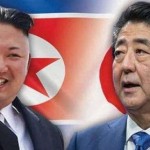In the surprising and swift turn of events centered around North Korea’s outreach to the world, the principal protagonists so far have been China, the United States and South Korea. But there is another player, Japan, which has long perceived North Korea as a direct strategic and military threat and is in the frontline as host to the largest number of U.S. military personnel in the region.
Japan has been noticeably missing from the list of summit meetings initiated by the North Korean leader, Kim Jong-un. Kim has already met Chinese President Xi Jinping during his visit to Beijing (March 25-28), and is slated to meet South Korean President Moon Jae-in on April 27. This will be followed by a meeting with Donald Trump in May, the first ever between a leader of North Korea and a serving U.S. president.
The atmosphere in Japan is one of consternation. Tokyo feels left out of influencing moves that have an important bearing on its immediate strategic neighbourhood. This, despite President Moon having sent his special envoy, Suh Hoon, Director of National Intelligence, to Tokyo on March 13 to brief Prime Minister Abe on the talks. (On March 5 Hoon accompanied South Korea’s National Security Adviser, Chung Eui-Yong, to Pyongyang to meet the North Korean leadership.) President Trump also called Abe on March 9 shortly after accepting the invitation to a Summit meeting with Kim. Given the cool relations with China in recent years post the Senkaku dispute, Kim’s visit to Beijing in acknowledgement of China’s pivotal role in the emerging scenario on the Korean peninsula, has brought little comfort to Japan.
North Korea’s nuclear weapons and missile development programmes have been a common threat which elicited opposition even from China. But Japan–more than others–has felt that it was more acutely and directly threatened by the reality of dozens of North Korean missiles targeting its territory. That capability has been demonstrated over the past couple of years through repeated missile tests which could cover the whole archipelago.
Japan has also had to deal with the abduction of its citizens by North Korea in the 1970s and 1980s, which continues to loom large in the public consciousness. Prime Minister Abe had made the return of the abductees an emotive plank of his election campaigns. While Japan claims that it has records of 18 out of perhaps hundreds abducted, North Korea has admitted to only 13, and returned five. Japan had consistently given high priority to the return of the rest and is now afraid that in this rash of summitry, the plight of its abductees will be set aside for tactical gains.
The Japanese position on North Korea has, in recent times, therefore been the toughest among those of the principal players. Prime Minister Abe has stuck to the Japanese mantra of exerting “maximum pressure” on North Korea to abandon its nuclear and missile programmes “in a verifiable and irreversible way”.[1] Abe maintains that dialogue for the sake of dialogue is of little use and North Korea must be forced to take specific action. Japan has also used its two-year membership of the UN Security Council, since 2016, to force a tougher line on economic sanctions against North Korea, including hosting a UNSC ministerial meeting on North Korea in Tokyo on December 15 during its presidency of the Council.
Japan is now proactively reacting to North Korea’s recent overtures by reaching out to the U.S., South Korea and China. A meeting with President Trump is scheduled in Florida on April 17-18 with North Korea on the agenda. There are reports that Japan sought a meeting with President Moon prior to the Moon-Kim summit of April 27, but will have to settle for a visit by Foreign Minister Taro Kono to Seoul, who will spell out concerns that Japan hopes will be placed on the table at the summit. An opportunity for talks with the Chinese will arise during Premier Li Keqiang’s visit to Tokyo in early May for the Japan-South Korea-China summit which has been resumed after a hiatus. (The Sixth Japan-China-Republic of Korea Trilateral Summit Meeting was held in November 2015[2].) Domestically, Prime Minister Abe told a parliamentary committee that Tokyo had been communicating through ‘various means’ on the possibility of a summit meeting with Kim. June has been mentioned as a possible date without confirmation.
Japan will certainly use every channel and opportunity to ensure that its concerns are not lost in the enthusiasm to cut a deal with Kim Jong-un. It fears, with good reason, that while seeking to roll back North Korea’s intercontinental ballistic missile programme, the issue of short and medium-range missiles which threaten Japan might be set aside.
Nobody can believe that denuclearisation will, in effect, take place even though Prime Minister Abe welcomed North Korea’s offer to discuss the subject. Though both South Korea and Japan are alliance partners of the U.S., united in their mistrust of North Korea, relations between the two Asian neighbours have been bedevilled by historical and territorial disputes, and Japan cannot rely on South Korea under President Moon to push its concerns.
Finally, there is unease with the unpredictability of President Trump who, after threatening fire and fury, acquiesced to a Summit meeting despite little progress to report on issues related to North Korea’s nuclear and missile programmes.
Deepa Wadhwa is former Indian Ambassador to Japan.
This article was exclusively written for Gateway House: Indian Council on Global Relations. You can read more exclusive content here.
For interview requests with the author, or for permission to republish, please contact outreach@gatewayhouse.in or 022 22023371.
© Copyright 2018 Gateway House: Indian Council on Global Relations. All rights reserved. Any unauthorized copying or reproduction is strictly prohibited.
Reference
[1] Ministry of Foreign Affairs, Government of Japan, Japan-China-ROK Trilateral Summit, 2 November 2015, <http://www.mofa.go.jp/region/asia-paci/jck/summit.html>
[2] Iwamoto, Kentaro, “No dialogue with North Korea without denuclearization, Abe says”, Nikkei Asian Review, 12 September 2017, <https://asia.nikkei.com/Features/Interview/No-dialogue-with-North-Korea-without-denuclearization-Abe-says>


